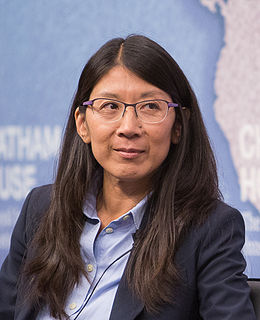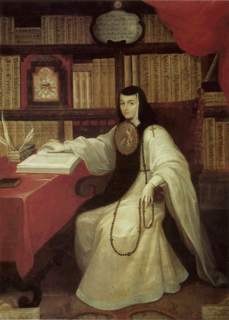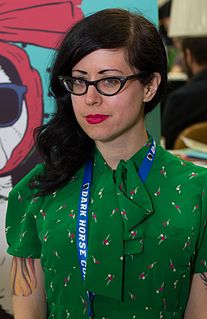A Quote by Colin Mochrie
My mother on her death bed told me, 'Where the hell did that kangaroo come from!?' - it just popped out of nowhere and punched her in the head and caused a cerebral hemorrhage, so I thought I'd move to a country where there were no kangaroos!
Related Quotes
Perhaps I will die too, she told herself, and the thought did not seem so terrible to her. If she flung herself from the window, she could put an end to her suffering, and in the years to come the singers would write songs of her grief. Her body would lie on the stones below, broken and innocent, shaming all those who had betrayed her. Sansa went so far as to cross the bedchamber and throw open the shutters ... but then her courage left her, and she ran back to her bed, sobbing.
The casting director on the movie made me aware of her. She told me what to watch Starter For Ten, which I did and thought she was great in. She was just so charming and beautiful. But I felt she could probably look plain if we tried. And when I subsequently met with her, I was so charmed by her vulnerability and sweetness. Those were two qualities that were the most important for that character.
People inspire me. Every day, I meet amazing individuals in the field. When I see a mother who has walked for three weeks to come to a MSF clinic, with two kids on her back and her belongings on her head, facing intimidation and physical abuse on her way, I am inspired by her resilience - her desire for life.
I was not yet three years old when my mother determined to send one of my elder sisters to learn to read at a school for girls we call the Amigas. Affection, and mischief, caused me to follow her, and when I observed how she was being taught her lessons I was so inflamed with the desire to know how to read, that deceiving - for so I knew it to be - the mistress, I told her that my mother had meant for me to have lessons too. ... I learned so quickly that before my mother knew of it I could already read.
I know I belong in Dauntless because everything I did in that aptitude test told me so. I'm loyal to my faction for that reason -- because there's nowhere else I could possibly be. But her? And you?" She shakes her head. "I have no idea who you're loyal to. And I'm not going to pretend like everything's okay.
... until Miri could not help it any longer and she laughed out loud. The sound broke the game. Peder looked at her. He reached out, and she thought he meant to grab her straw or perhaps yank her hair as he used to when they were little. But her put his hand behind her head and, leaning forward, pulled her face to his. He kissed her. One long, slow kiss.
I missed the sound of her shuffling her homework while I listened to music on her bed. I missed the cold of her feet against my legs when she climbed into bed. I missed the shape of her shadow where it fell across the page of my book. I missed the smell of her hair and the sound of her breath and my Rilke on her nightstand and her wet towel thrown over the back of her desk chair. It felt like I should be sated after having a whole day with her, but it just made me miss her more.
I just don't think that being unable to forgive someone is the most healing move. It can be, and I've had times in my life when I thought I would be better off without the drama that another person was bringing to me, but cutting someone out isn't always the answer. I know someone who cut her mother out and it didn't magically heal her. She's still haunted. It's not as if you can wipe clean all of your memories of having a mother, or wanting or needing one.
I talked to my mother about it a lot. I asked her what it was like to grow up in New York and Harlem in the 1920s and 1930s, and I asked her about a woman leaving her husband. I asked her about how she would feel about that woman, and my mother grew up in the Church Of God In Christ, and she told me that the woman might be isolated because the other women thought she might go and come after their husbands. That's how they thought then.
And so when Mrs. Darling went back to the night-nursery to see if her husband was asleep, all the beds were occupied. The children waited for her cry of joy, but it did not come. She saw them, but she did not believe they were there. You see, she saw them in their beds so often in her dreams that she thought this was just the dream hanging around her still.
She liked being reminded of butterflies. She remembered being six or seven and crying over the fates of the butterflies in her yard after learning that they lived for only a few days. Her mother had comforted her and told her not to be sad for the butterflies, that just because their lives were short didn't mean they were tragic. Watching them flying in the warm sun among the daisies in their garden, her mother had said to her, see, they have a beautiful life. Alice liked remembering that.




































